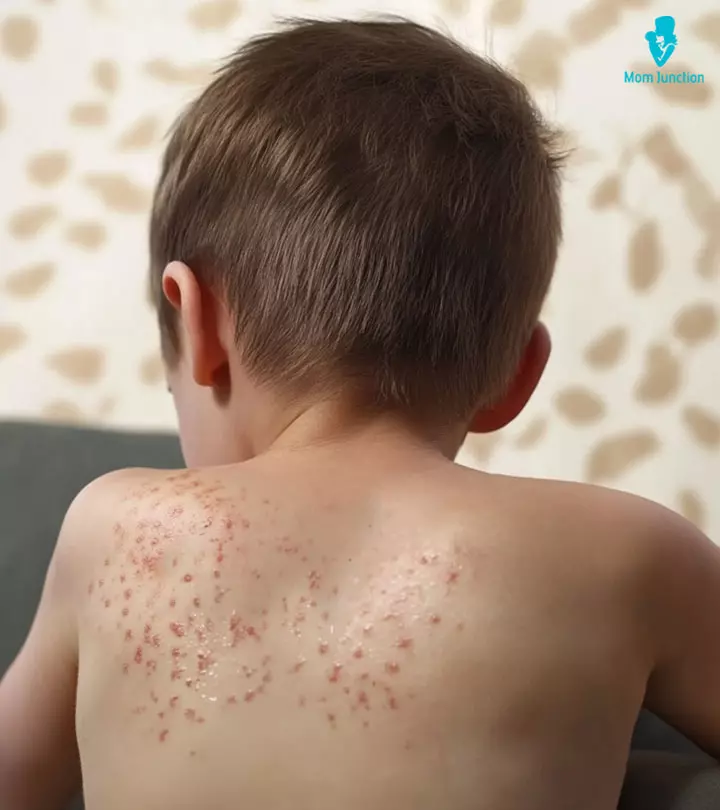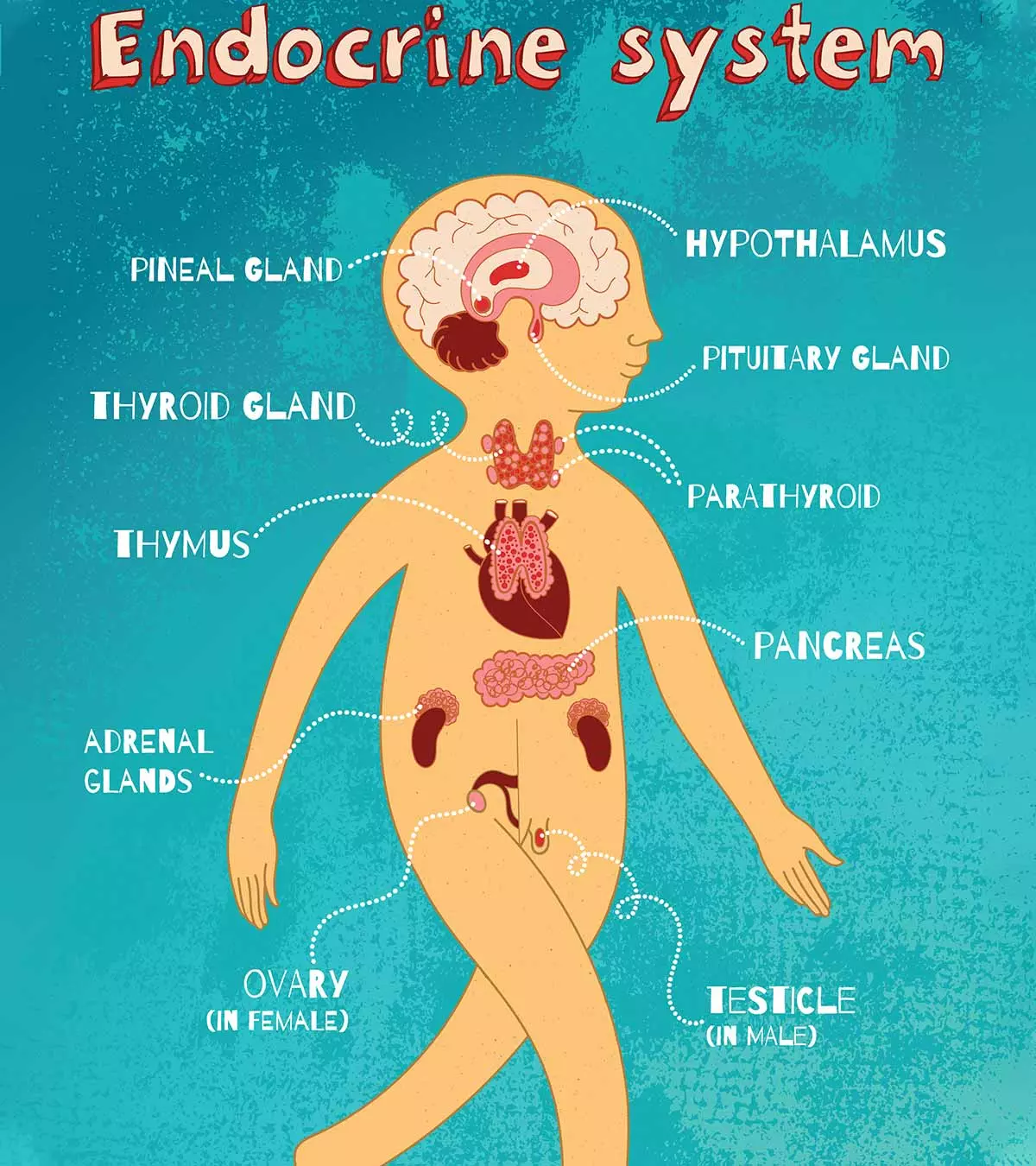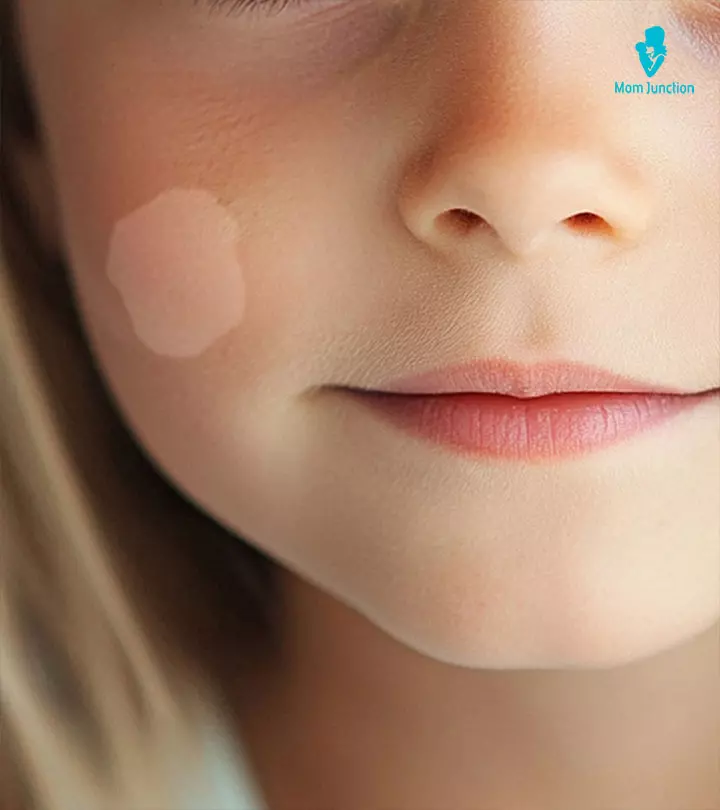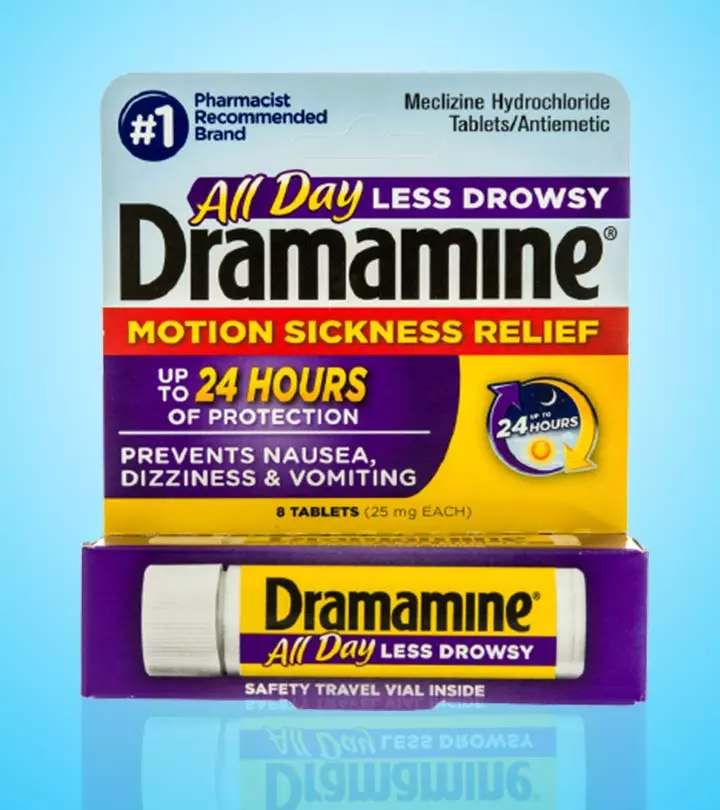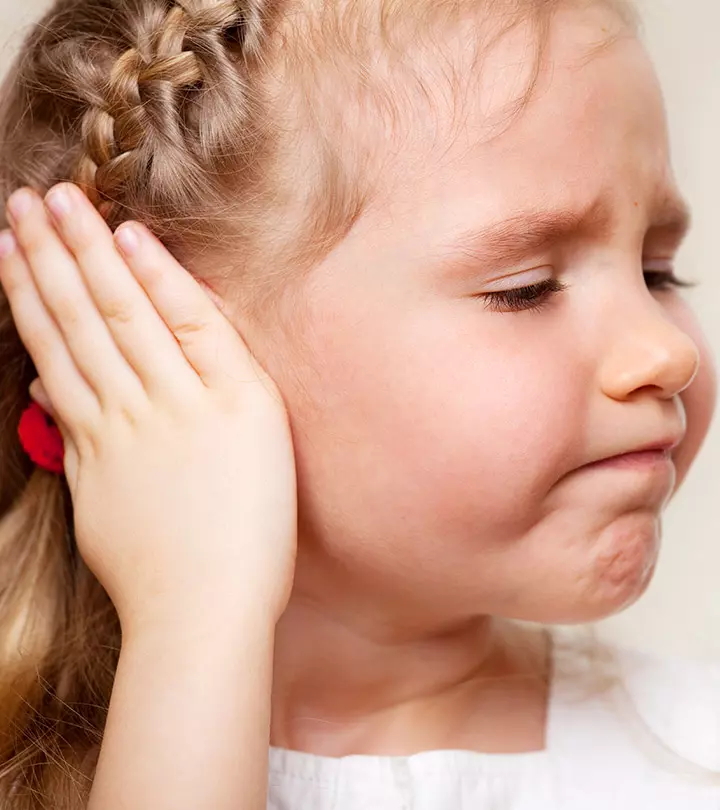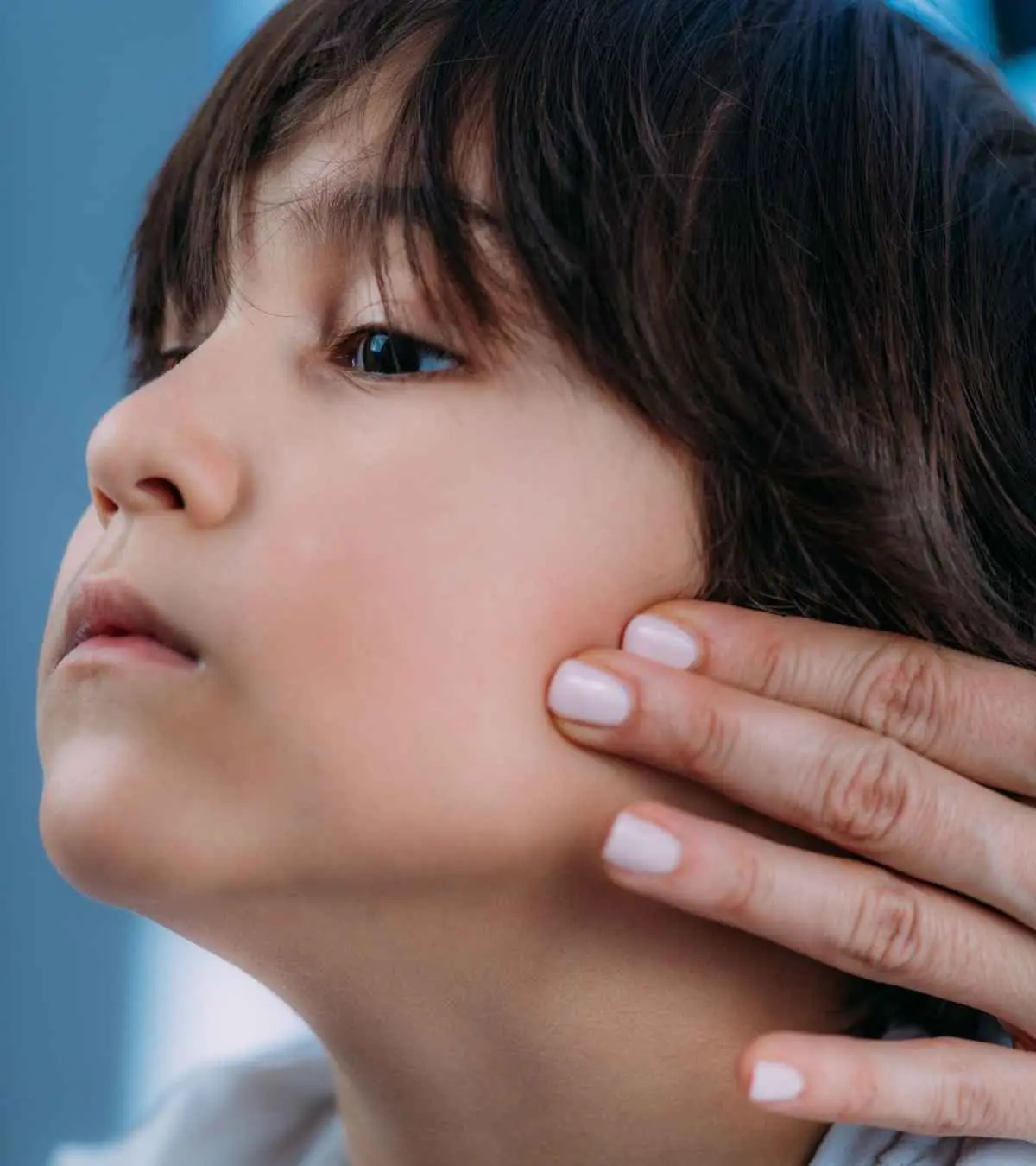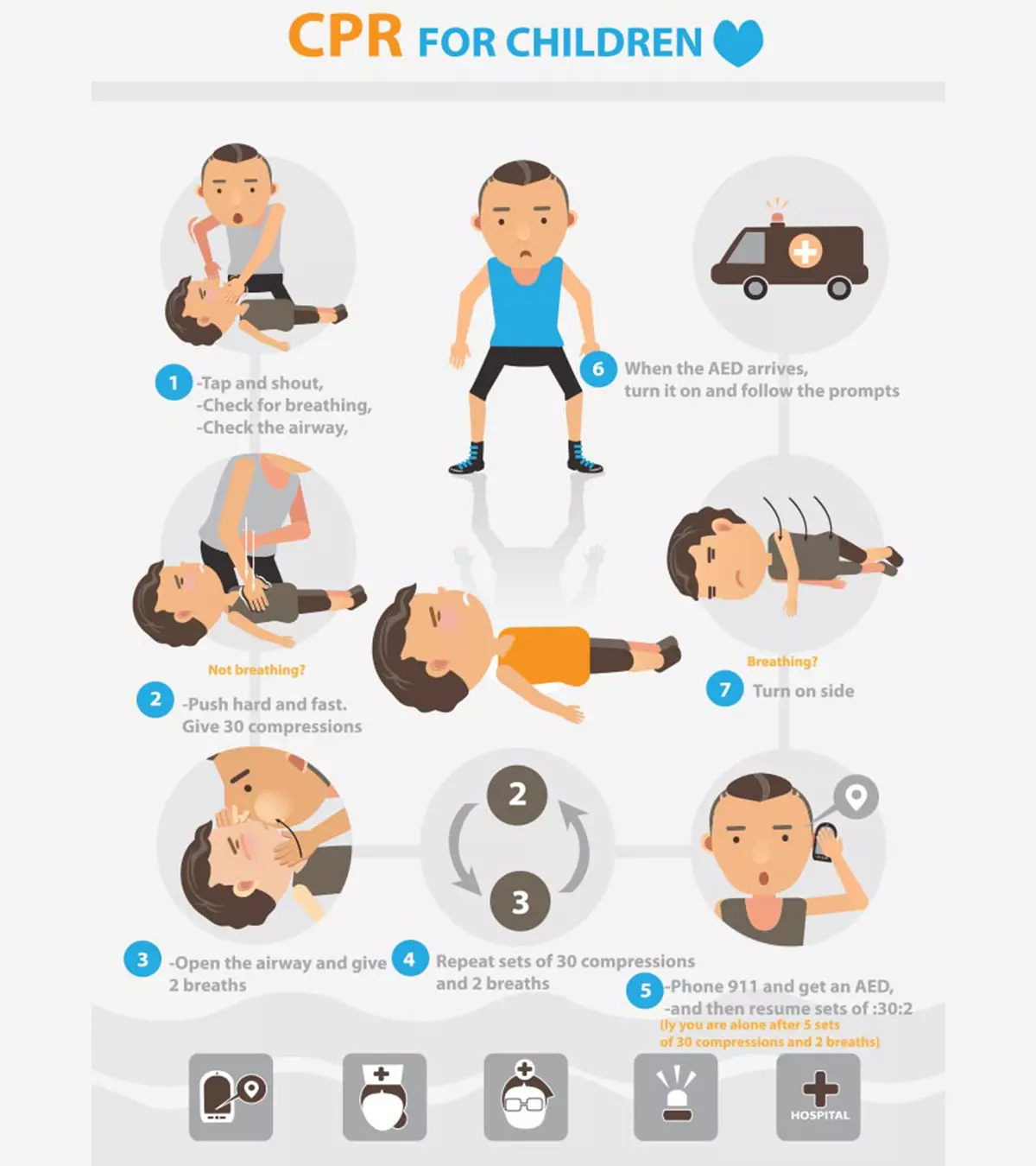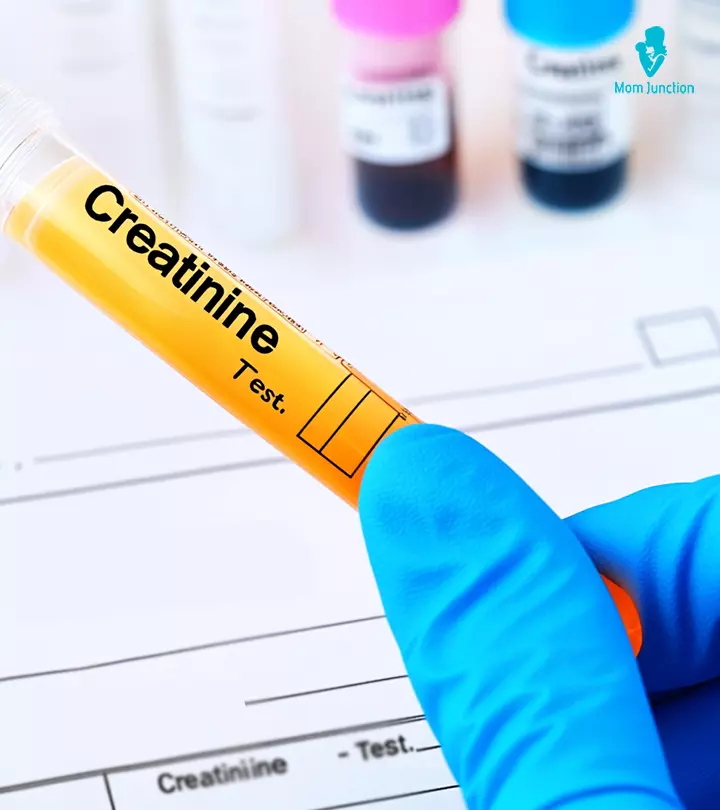
Image: Midjourney/ MomJunction Design Team
Renal disease, neuromuscular disorders, and urinary tract obstructions can cause low creatinine in children. However, creatinine levels may vary depending on a person’s age, gender, and health status. Usually, men have higher creatinine levels than women, and children have lower levels than adults (1) (2).
Creatinine is a waste product produced in the body during muscle metabolism. It is transported in the blood to the kidneys and eliminated from the body. Urine tests and blood tests help determine the amount of creatinine in the body.
Read this post to know the causes, symptoms, diagnosis, and treatment of low creatinine in children.
Key Pointers
- Impaired renal function can cause a drop in serum (blood) and urine creatinine levels.
- Fatigue, loss of muscle strength, poor development, lethargy, tooth decay, etc., are signs of low creatinine levels in children.
- Urinalysis and creatinine blood tests can diagnose its levels at an early stage.
- Even if there are no symptoms at first, high serum creatinine levels can indicate renal issues.
Importance Of Monitoring Creatinine Levels
Monitoring creatinine levels is crucial for assessing a child’s kidney function and overall health. Serum creatinine levels rise only after significant loss of kidney function, about 50%, making early detection necessary (3). A study states, “Acute and chronic kidney diseases are major public health problems and even relatively small rises in serum creatinine have been found to be associated with an increased risk of morbidity and mortality (4).”
Regular testing helps in the early detection of potential health issues, allowing for timely intervention and management. Regular testing may also help monitor the renal development of the child and help healthcare providers determine treatment efficiency in case the child has kidney dysfunction (5) (6). Point-of-care creatinine testing may help in frequent monitoring, enabling earlier detection of deterioration (7).
Creatinine levels can reveal more than just kidney health. They can also give clues about a child’s muscle mass and overall metabolism (3). Unusual levels may indicate other health problems that need further investigation.
Causes Of Low Creatinine Level In Children
The normal blood creatinine level in children between three and 18 years is 0.5 to 1.0 milligrams per deciliter (mg/dL), and for children below three years, it is 0.3 to 0.7 mg/dL (1). Sometimes, the serum creatinine (blood creatinine) level drops below normal due to the following causes (1) (8) (9) (4):
- Low muscle mass: Low muscle mass is a significant contributor to reduced creatinine levels. This condition can stem from several factors:
- Malnutrition: A diet poor in ample nutrients can lead to muscle wasting. Children with poor dietary habits, especially those lacking protein, may experience reduced muscle mass.
- Inadequate Physical Activity: Sedentary lifestyles can contribute to muscle loss.
- Neuromuscular Diseases: Conditions affecting muscle function, such as muscular dystrophy, can lead to decreased muscle mass and consequently lower creatinine levels (10).
- Liver failure: When the liver is not functioning properly, it can lead to decreased production of waste products like creatinine.
- Excessive weight loss in kids: Rapid weight loss in children, whether due to illness or dietary restrictions, can result in loss of muscle mass and consequently lower creatinine levels.
- Impaired renal functioniA condition when the kidneys are unable to eliminate waste and maintain fluid balance : Conditions affecting kidney health can disrupt normal creatinine production and clearance.
Furthermore, the creatinine clearance (urine creatinine) level may drop due to the following causes (11):
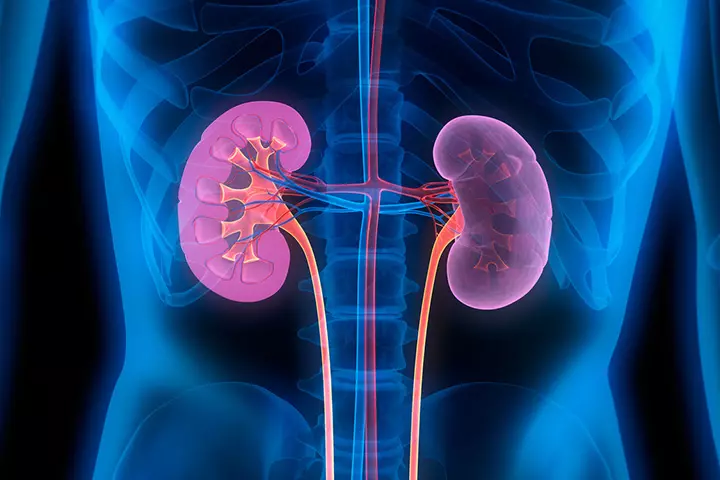
- Kidney disease: Chronic kidney disease can impair the kidneys’ ability to filter waste effectively.
- Blocked urinary tract: Obstructions in the urinary tract can lead to the retention of waste products, affecting creatinine levels.
- Heart failure: In children, heart conditions can lead to decreased blood flow to the kidneys, impacting their filtering capacity.
- Dehydration: Insufficient fluid intake can concentrate urine and affect creatinine clearance.
Symptoms Of Low Creatinine Level In Children
Low creatinine levels in children do not cause specific symptoms. The symptoms are an outcome of the underlying condition, which are as follows (12) (13) (14) :
- Poor posture, fatigue, and loss of muscle strength for low muscle mass
- Liver enlargement, itching, fatigue, and jaundice for chronic liver disease
- Being underweight or overweight, poor growth, lethargy, and tooth decay from poor nutrition
 Quick tip
Quick tipDiagnosis Of Low Creatinine Level In Children
Under typical conditions, it is advisable to assess creatinine levels on an annual basis (16). Two types of tests help diagnose the creatinine levels in children:
- Serum creatinine level: The blood creatinine level is measured through a blood test. If the level is lower than normal, it may indicate problems with the muscles, nerves leading to the muscles, liver, or nutrition (17).
- Creatinine clearance: This test indicates how well the kidneys remove creatinine from the blood and accurately detects kidney function issues. Creatinine clearance involves testing a blood and urine sample collected over 24 hours. The time of urine collection is an important factor for accurate diagnosis (18).
The creatinine clearance test used to be a common way for healthcare providers to assess kidney function, but it is not as frequently used now. This is because it requires collecting urine over 24 hours, which can be inconvenient for patients. Instead of this test, doctors use a blood test called the estimated glomerular filtration rate (eGFR) along with a urine test called the urine albumin-creatinine ratio (uACR). These tests are easier since they only require a single urine sample (18).
Children are advised to do the following before the test (11) (18):
- Refrain from eating overnight
- Avoid meat for 24 hours
- Drink plenty of fluid for urine collection
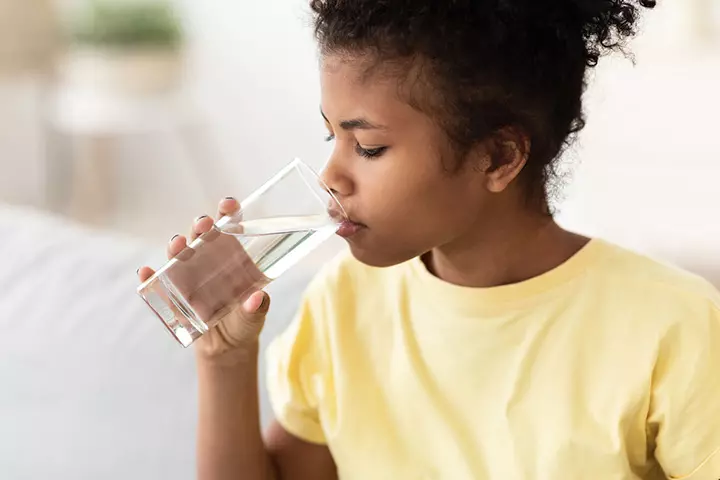
Since low creatinine levels generally indicate muscle loss, further assessments such as a muscle biopsyiA minor surgical procedure where a sample of tissue from a specific muscle is removed to diagnose muscle-related conditions , blood tests, and an electromyogramiA device for capturing the electrical activity of skeletal muscles can determine the reason (19).
Treatment Of Low Creatinine In Children
Your child’s healthcare provider may advise treatments based on the causes.

- If the creatinine level is low due to malnutrition, consuming a balanced diet by adding fruits and vegetables, meat, fish, eggs, starchy food, and dairy products will help control the condition (20).
- If a child has liver problems, medications, lifestyle changes, and surgery help treat the condition (21).
- In case of loss in muscle mass, medications, physical therapy, surgery, support of a walker and walking machines, and nutritional counseling are suggested (19). Physical activity is recommended for increasing the body’s serum creatinine level (22).
- Creatine supplements may be given; however, such supplements have not yet been determined safe for children under 18 years. A study in 2012 found that 62 out of 1103 middle and high school students in the US used creatine supplements, but as their safety is still questionable, intake may lead to further problems (23).
High Creatinine Levels: Causes And Symptoms
High levels of creatinine in the body can be determined with a blood test. The causes of high creatinine levels in children are (1) (8) (24) (25)
- Chronic kidney disease
- Muscle disease
- Blocked urinary system
- Diabetes
- Dehydration
- Excess protein in the diet
- Overactive thyroid
- Congestive heart failure (the heart works harder than normal to pump blood)
- Pediatric medicines
- Shock
High levels of serum creatinine may indicate kidney disease in children without noticeable symptoms in the beginning. However, as the disease progresses, it produces these symptoms (8) (18):
- Unexplained fatigue
- Dehydration
- Less urine
- Dark urine
- Swollen feet, face, and eyes
- Loss of appetite
- Nausea
- Itching
 Be watchful
Be watchfulFrequently Asked Questions
1. What level of creatinine indicates kidney failure in a child?
Normal creatinine levels for each child can vary depending on their body size. So, the creatinine levels indicating renal failure can also vary in children. Pediatric nephrology specialists (kidney specialists) assess the creatinine levels with child size to establish the diagnosis. For example, if the normal creatinine level for a child with a specific size is 0.5, the child’s kidneys are in 100 percent working condition. Kidney function can be half for the same child if the creatinine level rises to one. If the creatine is between one and two, kidney function would be only 25% (26).
2. Does drinking water help creatinine levels?
Drinking enough water can reduce creatinine levels. But, this will not improve kidney function. That means drinking water only gives you low creatinine levels on tests and does not make a difference in existing kidney problems such as kidney damage or kidney injury. Excess water intake can also be harmful as low water intake (27). Excess water intake can also be harmful as low water intake.
3. How often should a child’s creatinine levels be monitored?
There is no ideal time to monitor creatinine levels. However, you may do your child’s blood and urine test routinely every year. In this way, it is believed that any early signs of illness may be effectively diagnosed.
4. Can low creatinine levels be a hereditary condition in children?
Child specialist Dr. Mubina Agboatwala opines, “Low creatinine levels can be hereditary in a rare condition known as CCDS, which is associated with delayed mental development, seizures, hypotonia, and other symptoms. However, this condition is very rare in children.”
Low creatinine in children may occur due to several reasons. It is not considered a disease on its own but usually indicates an underlying health condition such as thyroid, diabetes, low muscle mass, or issues related to kidney health. Therefore, parents should immediately consult their child’s pediatrician if they notice symptoms related to these conditions. The treatment process for low creatinine levels will be based on the diagnosis. It is advised that children should follow the treatment procedure diligently to speed up their recovery.
Infographic: More About Creatine Supplements
The use of creatine supplements in children has not been thoroughly studied. However, these supplements are promising in providing benefits to children with low creatinine levels and improving athletic performance. The infographic below summarizes the benefits and safety of such supplements. Illustration: Momjunction Design Team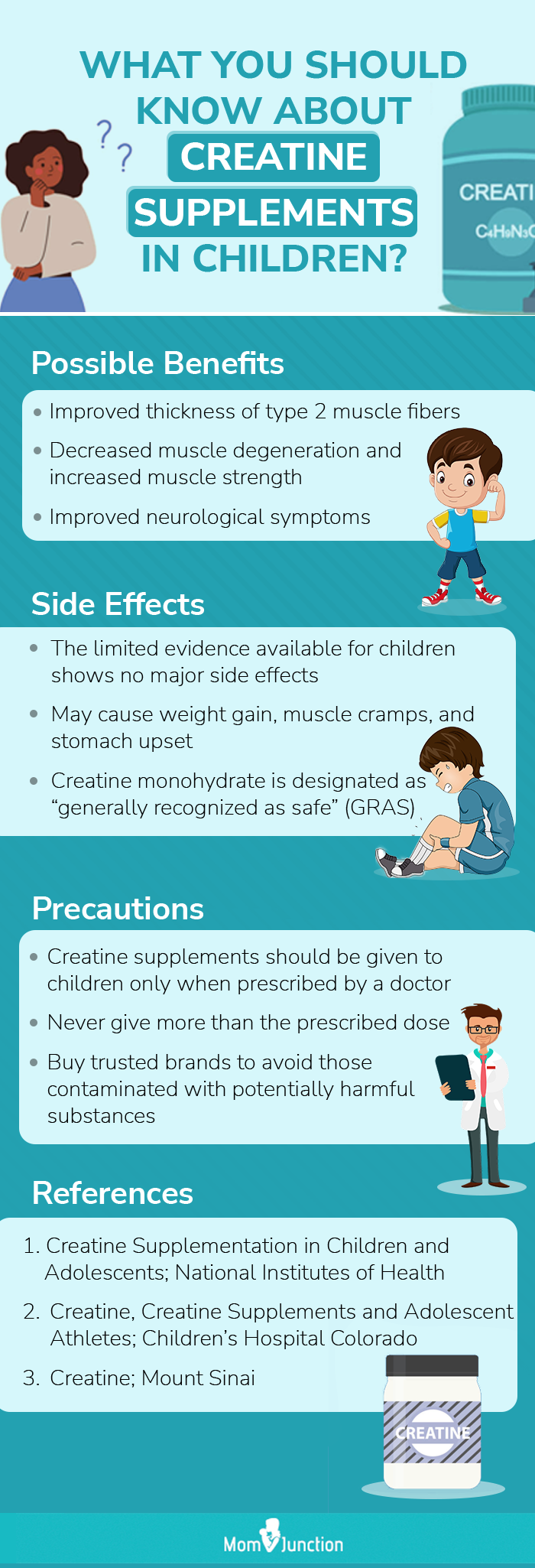
Illustration: Low Creatinine In Children: Causes Symptoms Diagnosis And Treatment
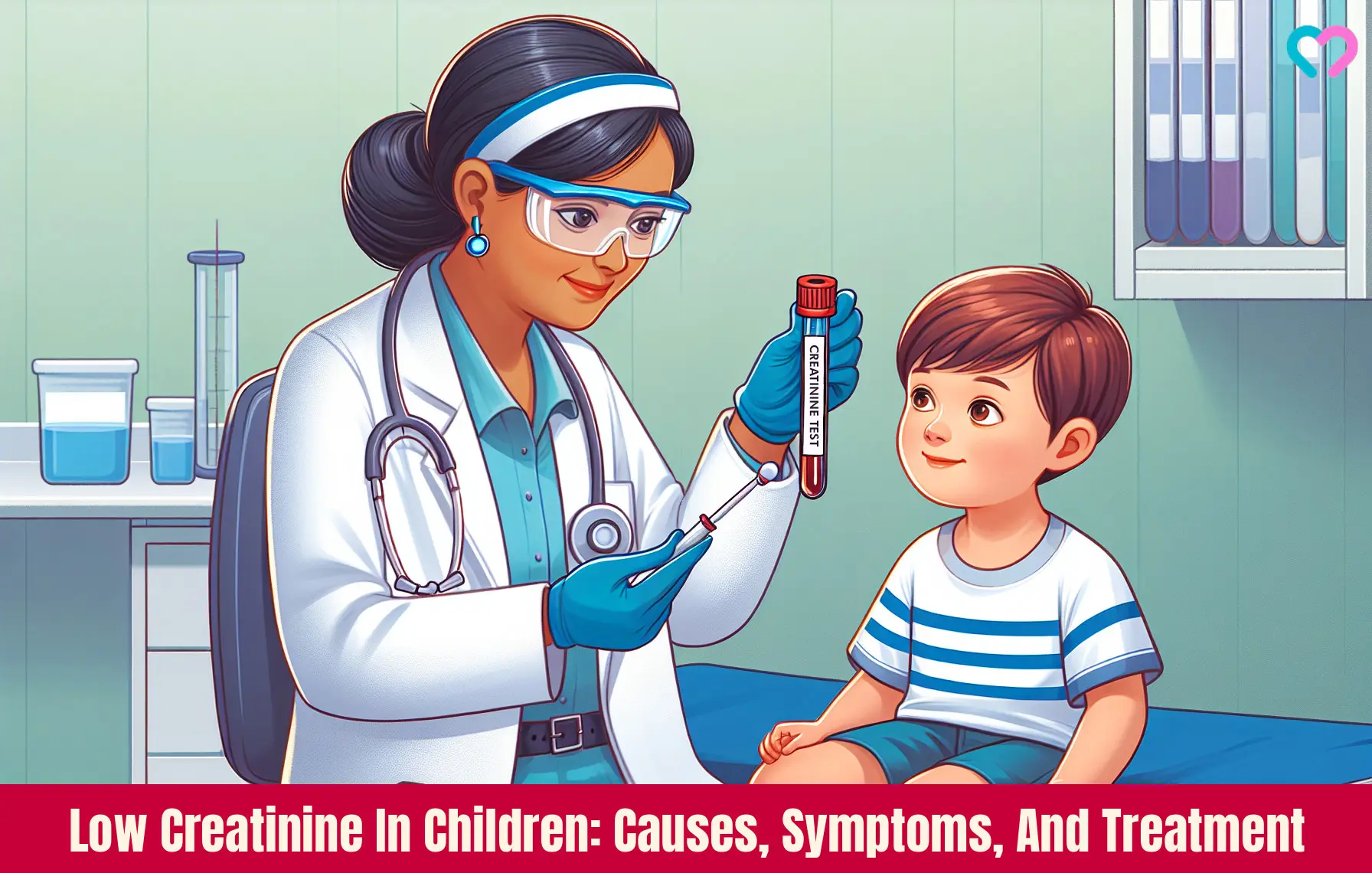
Image: Dall·E/MomJunction Design Team
References
- Creatinine (Blood).
https://www.urmc.rochester.edu/encyclopedia/content?ContentTypeID=167&ContentID=creatinine_serum - Urine Test: Creatinine.
https://kidshealth.org/en/parents/test-creatinine.html - Renal Function Tests.
https://www.ncbi.nlm.nih.gov/books/NBK507821/ - Marlies Ostermann et.al;(2016); The two sides of creatinine: both as bad as each other?
https://www.ncbi.nlm.nih.gov/pmc/articles/PMC4958791/ - Guidance for clinicians managing children at risk of or with acute kidney injury.
https://www.thinkkidneys.nhs.uk/aki/wp-content/uploads/sites/2/2016/05/Guidance-for-paediatric-patients-FINAL-1017.pdf - Creatinine Test.
https://medlineplus.gov/lab-tests/creatinine-test/ - Oghenekome Gbinigie et.al; (2015); Creatinine point-of-care testing for detection and monitoring of chronic kidney disease: primary care diagnostic technology update.
https://pmc.ncbi.nlm.nih.gov/articles/PMC4617263/ - Carlos A. Amado Diagoa, José A. Amado Señarisb; 2020; Should we pay more attention to low creatinine levels?
https://www.elsevier.es/en-revista-endocrinologia-diabetes-nutricion-english-ed–413-articulo-should-we-pay-more-attention-S2530018020300962 - Here’s How To Check If Your Kidneys Are Working Fine.
https://www.narayanahealth.org/blog/heres-how-to-check-if-your-kidneys-are-working-fine - Elles M Screever et.al; (2021); Kidney Function in Patients With Neuromuscular Disease: Creatinine Versus Cystatin C.
https://pmc.ncbi.nlm.nih.gov/articles/PMC8498206/ - Creatinine and Creatinine Clearance.
https://www.mottchildren.org/health-library/hw4322#hw4325 - Low muscle tone.
https://www.rch.org.au/kidsinfo/fact_sheets/Low_muscle_tone/ - Liver Disease.
https://www.stlouischildrens.org/conditions-treatments/liver-disease - Nutrition – school-age to adolescence.
https://www.rch.org.au/kidsinfo/fact_sheets/Nutrition_older_children/ - Creatinine (Blood).
https://johnshopkinshealthcare.staywellsolutionsonline.com/Conditions/Asthma/167creatinine_serum - Creatinine and eGFR – Measuring Kidney Function; United States Department of Veterans Affairs
https://www.va.gov/EKIDNEYCLINIC/rooms/laboratory/pdfs/creatinine-and-egfr.pdf - Creatinine blood test.
https://www.ucsfbenioffchildrens.org/medical-tests/creatinine-blood-test%5C%5C - Creatinine Clearance Test.
https://my.clevelandclinic.org/health/diagnostics/16380-creatinine-clearance-test - Muscular Dystrophy.
https://kidshealth.org/en/parents/muscular-dystrophy.html - Malnutrition.
https://www.nhs.uk/conditions/malnutrition/ - Liver Failure in Children.
https://www.nationwidechildrens.org/conditions/liver-failure-in-children - Alessandra Calábria Baxmann et.al; (2008); Influence of Muscle Mass and Physical Activity on Serum and Urinary Creatinine and Serum Cystatin C.
https://www.ncbi.nlm.nih.gov/pmc/articles/PMC2390952/ - Robert Cooper et.al; (2012); Creatine supplementation with specific view to exercise/sports performance: an update.
https://www.ncbi.nlm.nih.gov/pmc/articles/PMC3407788/ - Creatinine.
https://www.kidney.org/kidney-topics/creatinine - Victoria Cheung et.al; (2015); Restless Legs Syndrome in Pediatric Patients With Nephrotic Syndrome.
https://www.ncbi.nlm.nih.gov/pmc/articles/PMC4784599/ - How Kidneys Work.
https://www.childrenscolorado.org/doctors-and-departments/departments/kidney/how-kidneys-work/ - Avoid the superfood trap: Tips to improve your creatinine and eGFR.
https://www.kidneyfund.org/article/avoid-superfood-trap-tips-improve-your-creatinine-and-egfr
Community Experiences
Join the conversation and become a part of our nurturing community! Share your stories, experiences, and insights to connect with fellow parents.
Read full bio of Dr. Neema Shrestha
- Dr. Mubina Agboatwalla is the head of the department of pediatrics at Karachi Liaquat Hospital, Pakistan. She has over 20 years of experience in the field of pediatrics and 50 research papers published in international journals including Lancet and JAMA. Dr. Agboatwalla is also a public health specialist specializing in preventive health including nutrition, breastfeeding and infectious diseases, especially diarrhea, polio, and tuberculosis. She has affiliations with the Center of Disease Control Atlanta (CDC), UNICEF, and WHO.
 Dr. Mubina Agboatwalla is the head of the department of pediatrics at Karachi Liaquat Hospital, Pakistan. She has over 20 years of experience in the field of pediatrics and 50 research papers published in international journals including Lancet and JAMA. Dr. Agboatwalla is also a public health specialist specializing in preventive health including nutrition, breastfeeding and infectious diseases, especially diarrhea, polio, and tuberculosis. She has affiliations with the Center of Disease Control Atlanta (CDC), UNICEF, and WHO.
Dr. Mubina Agboatwalla is the head of the department of pediatrics at Karachi Liaquat Hospital, Pakistan. She has over 20 years of experience in the field of pediatrics and 50 research papers published in international journals including Lancet and JAMA. Dr. Agboatwalla is also a public health specialist specializing in preventive health including nutrition, breastfeeding and infectious diseases, especially diarrhea, polio, and tuberculosis. She has affiliations with the Center of Disease Control Atlanta (CDC), UNICEF, and WHO.
Read full bio of Pragya Bhargavi
Read full bio of Dr. Ritika Shah
Read full bio of Dr. Joyani Das










